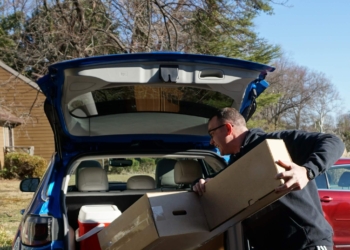The Air Force is helping to change the way schools support military kids at Maxwell AFB.
Air Force spouse Melissa Hamlett had mixed feelings about her husband’s next assignment to Maxwell AFB in Montgomery, Alabama, in spring of 2020. He was selected to attend Air War College late in the assignment process. The new assignment was a good move for her his career, but she had a rising senior in high school and an eighth-grader.
Like many military parents with school-aged children, Hamlett was torn — the choice was either to live a year without her husband or move her children to a new school in a place that had a reputation for a subpar education. Challenging for any family, but during a pandemic, the stress of this PCS seemed more intense.
She decided to keep her family together and make the move to Alabama. This move would be her 10th PCS in 19 years and her second time at Maxwell AFB. The school search started immediately, but private schools were not an option because of the high cost of tuition. She had to find a public school that would support her scholar athlete.
In 2018, Lt. Gen. Anthony Cotton, then-Commander and President of Air University, spoke bluntly to a group of community leaders about the schools in the Montgomery area.
“I’m running into a problem. I can’t find faculty,” he said. “I’m having a hard time getting folks to apply to be faculty members here as I’m trying to lure them away from schools in the northeast, schools in Washington, D.C., schools in the midwest, schools from San Jose — Silicon Valley — and once again the feedback I get is pretty simple: It’s about the school system.”
He challenged local leaders, school districts and his own staff to dig deep to make meaningful change in the quality and communication of public schools surrounding Maxwell and Gunter. Cotton gave a voice to what thousands of military families feel when faced with orders to move to areas around the country with less than ideal school ratings.
“The reality is, if my kids aren’t happy, I’m not happy. If I have to try to spend so much time trying to understand how to get them ready and prepared for secondary education, then I’m not doing my mission as far as taking care of you, and making sure that I protect our country,” he said.
Change hasn’t come easy or fast for established school districts like those surrounding Montgomery, Alabama. In many cases, a change agent is needed to begin the process of making a meaningful difference. Cotton was likely that person for the community and progress continues through his inaugural Public K-12 Education Working Group — a group that collaborates with local leaders, school officials and Department of Defense Education Activity representatives to build better choices for service members and faculty.
And the group is a full-time job for Lt. Col. Christina Karvwnarvis, Chief of Academic Outreach for Air University.
“We are making progress. Schools are offering different enrollment options outside their zoned areas. And we have embarked on an awareness campaign through the River Region informing schools of the Interstate Compact on Educational Opportunity for Military Children,” she said.
Over the last two years, Karvwnarvis and her team have worked to bring an influx of education and professional development to the River Region area. She held local training for area educators and school administrators on the Compact, hosted packed resource fairs for area schools to learn more about military-connected students and engaged with local universities to help solve. Her team also launched a new section on their website for incoming families to learn more about school options K-12 Schools.
Progress is happening, and families say it’s benefiting them.
Chief Master Sgt. Mike Morgan and his wife, Kristen, had feelings similar to Hamlett’s when he was assigned to Maxwell AFB. With two children, the oldest being 15 years old, they were initially concerned about where she might attend high school if they were to live on base. However, they had heard change was in the air and options were available for military kids to attend a myriad of public schools in surrounding school districts.
“Don’t believe the hype, do the research. There are options now,” Mike Morgan said. “We have the hardest working school liaison office (SLO) in the country, she knows what she’s doing. Families need to contact the SLO before they go to find out what is available to them.
Kristen adds, “There are magnet high school options with unique learning for older kids. And the MEMS (Maxwell Elementary Middle School) is run by DODEA. There are choices for military families. My advice is to reach out before you move, go to the website to find what fits your family. Especially if there is an interest in magnet schools, due to an application window. If you need help, just ask.”
As for Hamlett and her high school senior, things have been more complicated than expected due to COVID. From slow communication to unexpectedly having to quarantine during the first few weeks of school, the pandemic added emotional hurdles to an already challenging transition.
But there was a bright spot to the heavy move. When Hamlett contacted the SLO before moving to inquire about the one thing her senior loved — cheer — the SLO put her in contact with the newest school district in the area, Pike Road School District.
“Before we moved though, we did reach out to the cheer coach at Pike Road and she was kind enough to allow our daughter to send in a tryout video along with a recommendation from her current coach, that was a huge encouragement to our daughter. The school liaison connected us. A little piece of familiarity,” Hamlett said.
Overall, Hamlett said she is happy she moved. Her daughter has been accepted into the college of choice and her eighth-grade son is thriving, adding it was well worth the chaos moving through a pandemic and the stress of changing schools to keep her family together.
Read comments







































